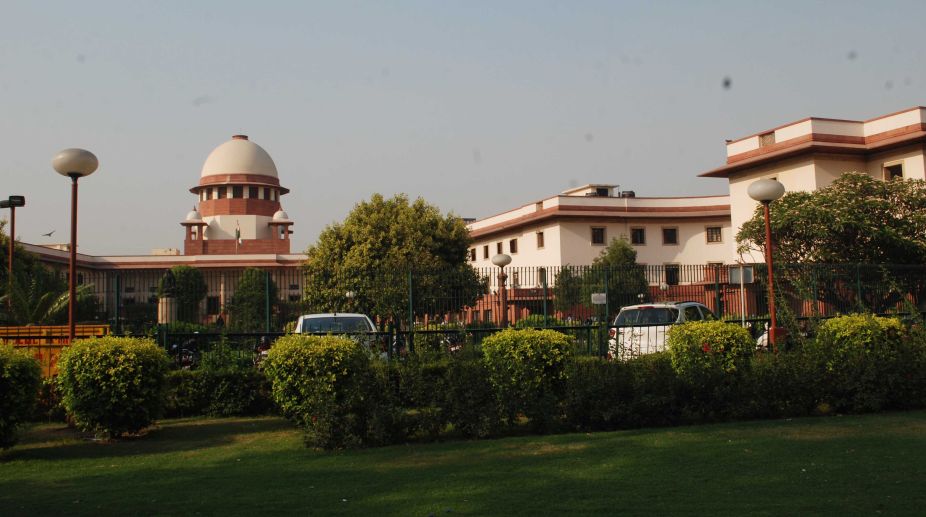Vikrant Massey’s ‘The Sabarmati Report’ gets nods from Amit Shah, Yogi Adityanath
Released on November 15, Vikrant Massey’s ‘The Sabarmati Report’ earns praises from Amit Shah, Yogi Adityanath, and Pramod Sawant.

(Photo: SNS)
The Supreme Court on Friday said it will pass order on the issue whether a court can direct the state to fund restoration of places of worship damaged due to its failure to maintain law and order, as it happened during the 2002 Gujarat riots.
A bench of Justices Dipak Misra and P C Pant while reserving its verdict asked the parties to file written submissions in the matter but clarified that "it should not be on communal lines".
It took on record the written submissions filed by Gujarat government and asked the counsel for NGO, Islamic Relief Committee of Gujarat (IRCG), to file their written submission by May 1.
Advertisement
The bench was hearing a petition filed by the Gujarat Government challenging the 2012 order of the High Court directing it to pay compensation to over 500 shrines damged during the post-Godhra riots.
The High Court had issued an interim direction for computation of actual damages to the places of worship to be made by 'special officers' who were district Judges.
While Gujarat Government had sought quashing of the High Court order contending that it was neither manageable, enforceable or capable of execution as per law, the IRCG had said the state government is liable to compensate those who suffered damages.
The apex court on August 27, 2013 had directed the maintenance of status quo on the February 8, 2012 order of the High Court and decided to examine the legal issues arising out of the matter.
Earlier, the court had said it has to be examined how far it would be constitutional to command the state to give money from its funds which come from tax payers for restoration, relocation and renovation of religious structures damaged due to its failure to maintain law and order situation.
The court had noted that in the instant case, government compensation relating to individuals have been completed, but the issue which was "bothering" was about the compensation for religious places.
The bench had also wondered under what provision of law was a district judge asked to act as a special officer to quantify the amount of damage.
The court had earlier said that whether the state, because of its failure to control law and order situation, can be asked to compensate with funds the restoration of temple, church, mosque or a gurudwara.
It had observed that whether a body collective, running such places of worship, can seek damage and compensation because the state has failed to maintain law and order leading to their damage.
It had said that some places of worship come up besides the roads and middle of the footpath and if relief is granted, then they would also seek compensation.
However, counsel for NGO had submitted that such structures would be classified as unauthorised and submitted that such comprehensive failure of law and order in Gujarat amounted to "acts of nonfeasance/misfeasance/ malfeasance in public law."
During the hearing, the Gujarat government, while assailing the High Court order, said the state fund which consists of payment of various taxes by citizens cannot be directed by the High Court to be spent for restoration or construction of any religious place by issuing a writ under Article 226 of the Constitution.
The article empowers High Courts to issue certain writs for the enforcement of any of the fundamental rights.
It had said that in the instant case, the aggrieved persons have not approached the court, but an NGO which was "a stranger to the issue", had approached the High Court for relief which was not permissible under the law.
It had contended that the High Court, in the present case, has directed the computation of actual compensation to 'places of worship' and has created a totally new remedy by the impugned judgement which is unknown to law.
The NGO has contended that the attack on religious places of worship was an attack on religious symbolism of people who hold them as sacred and destruction of places of worship belonging to weaker section of the society by a dominant group is to inflict humiliation on them and thereby violate Article 21 (Right to Life and Personal Liberty) of the Constitution.
It had said that NHRC has given findings that Gujarat has failed in its duty to extend the protection of law and recommended that places of worship should be repaired expeditiously, and added that these recommendation and findings were binding on the government.
Advertisement